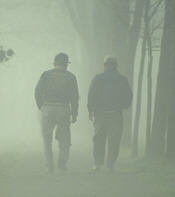 |


Limits Quality of Life Long Term Care Facilities Discriminate Against 'Deviants' Homophobia & Neglect are Widespread in Nursing Homes |
|
By Elizabeth Toledo and Sean Cahill
 A nursing assistant who enters a room without knocking sees two elderly
male residents engaging in oral sex. The two are separated immediately
after the assistant notifies her supervisor. Within a day, one man is
transferred to a psychiatric ward and placed in four-point restraints.
A community health board, holds that the transfer was a warranted
response to "deviant behavior."
A nursing assistant who enters a room without knocking sees two elderly
male residents engaging in oral sex. The two are separated immediately
after the assistant notifies her supervisor. Within a day, one man is
transferred to a psychiatric ward and placed in four-point restraints.
A community health board, holds that the transfer was a warranted
response to "deviant behavior."
This episode, reported in a 1995 article in Contemporary Long Term Care, would not surprise anyone familiar with the experiences of gay, lesbian, bisexual and transgender (GLBT) elders. In a society that desexualizes older people in general, the compounding influence of homophobia fosters a hostile environment for GLBT seniors. Homophobia and neglect appear widespread in nursing homes. In a recent survey of nursing home social workers, more than half said their coworkers were intolerant or condemning of homosexuality among residents, while most other respondents avoided answering the question. Other studies report that the staff in one nursing home staff refused to bathe a resident because they did not want to touch "the lesbian," and a home care assistant threatened to "out" a gay client if he reported her negligent care.
GLBT baby boomers--"out" for most of their lives--are increasingly unwilling to retreat to the closet when they encounter homophobia in aging services. The GLBT elderly population, currently estimated at 1 to 3 million people, will increase to a projected 4-6 million by 2030. However, the population is severely understudied, and we can only estimate the population's size because most research does not ask about sexual orientation or gender identity. These findings are included in a ground-breaking study released last month by the Policy Institute of the National Gay and Lesbian Task Force titled Outing Age: Public Policy Issues Affecting Gay, Lesbian, Bisexual and Transgender Elders. Among the study's other findings are:
Homophobic and heterosexist services and policies are exacerbated by the ageism and social isolation that elders often face within the GLBT community itself. GLBT media and activists often ignore old people and their concerns, and social institutions tend to be age-segregated. Ageism permeates our language, as in the characterization of older hang-outs as "wrinkle rooms." "Most of the gay and lesbian organizations go about their plans, totally insensitive, and without thinking [they] exclude us," says 77-year-old Vera Martin, a founding leader of Old Lesbians Organizing for Change. "We have a lot to share. Our life experiences can be a map for those coming behind us." Activists like Martin have created several gay-specific service organizations for GLBT elders. Senior Action in a Gay Environment, Pride Senior Network, Gay & Lesbian Outreach to Elders, and others provide services to GLBT elders and have pushed groups like NGLTF to do meaningful work on aging issues. To support these efforts, the GLBT community must examine its own ageism, value its older members, and recognize their unique concerns. GLBT activists must address aging issues, and also demand that the needs of GLBT seniors be incorporated into the work of mainstream aging organizations. Engaging aging policy is not just the right thing to do. It's also in our self-interest. After all, with luck we'll all be old and gray someday. Elizabeth Toledo is the executive director of the National Gay and Lesbian Task Force and Sean Cahill is the research director at the NGLTF Policy Institute. To order a copy of Outing Age, please visit www.ngltf.org. |

